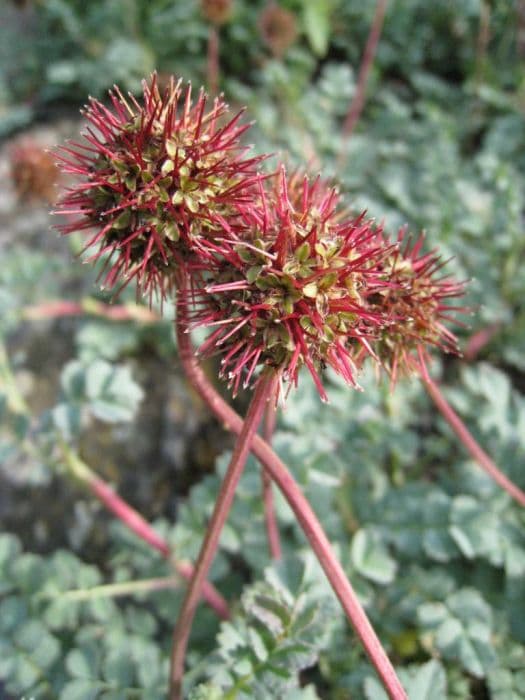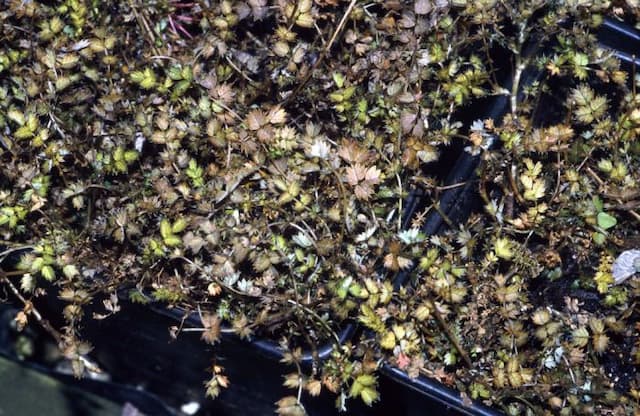Geoff Hamilton Rose Rosa Geoff Hamilton = 'Ausham' (PBR) (S)
![rose [Geoff Hamilton]](/_next/image?url=https%3A%2F%2Fplants-admin.emdemapps.com%2Fimages%2Fplants%2F%2Fimages%2F604b5708964d2.png&w=3840&q=75)
ABOUT
The Rosa Geoff Hamilton, often simply referred to as 'Geoff Hamilton' rose, presents a classic image of delicate beauty. This rose plant is adorned with an abundance of lush, green foliage that serves as a backdrop to its stunning flowers. The flowers themselves are a sight to behold, with a soft, pastel pink hue that emanates a gentle yet profound presence in any garden. Each flower is meticulously formed with a cup-shaped structure that gradually opens up to showcase a full, rounded bloom. Inside, the petals are arranged in a romantic, rosette pattern that is both intricate and harmonious. Each petal is velvety to the touch, contributing to the opulent texture of the bloom. The edges of the petals may exhibit a slight ruffle, adding to the overall charm of the flower. The blooms often appear in clusters, creating a magnificent display of color and form. As the flowers mature, they emanate a delightful fragrance that infuses the air with a sweet, floral aroma that is both fresh and captivating. This exquisite scent can transform a garden space, making it not only visually appealing but also an olfactory haven. The 'Geoff Hamilton' rose is a testament to the skill and artistry of plant breeders, offering a harmonious blend of visual and sensory delights that can be treasured throughout its blooming season.
About this plant
 Names
NamesFamily
Rosaceae.
Synonyms
Geoff Hamilton Rose, Austin Rose.
Common names
Rosa 'Ausham'
 Toxicity
ToxicityTo humans
The plant commonly known as the English Rose 'Geoff Hamilton' is not considered toxic to humans. Roses do not contain any substances that are known to be poisonous when ingested. However, the thorns on roses can cause physical injury if not handled with care.
To pets
The English Rose 'Geoff Hamilton' is generally considered non-toxic to pets. Ingesting the plant material might cause mild gastrointestinal upset in some animals, such as vomiting or diarrhea, but serious poisoning is unlikely. Nevertheless, as with humans, the thorns can pose a physical hazard, possibly causing injury if a pet attempts to chew on the plant.
 Characteristics
CharacteristicsLife cycle
Perennials
Foliage type
Deciduous
Color of leaves
Green
Flower color
Pink
Height
4 feet (1.2 meters)
Spread
4 feet (1.2 meters)
Plant type
Shrub
Hardiness zones
5
Native area
Cultivar
Benefits
 General Benefits
General Benefits- Attractive Blooms: Rosa 'Geoff Hamilton' produces beautifully formed, cupped roses with a pale pink color, adding ornamental value to any garden.
- Fragrance: This variety is known for its delightful and strong fragrance, providing a sensory treat for garden visitors.
- Repeat Flowering: It blooms repeatedly from late spring to fall, offering prolonged visual interest throughout the growing season.
- Disease Resistance: 'Geoff Hamilton' possesses good resistance to common rose diseases, such as blackspot and rust, reducing the need for chemical treatments.
- Versatility: Suitable for mixed borders, rose gardens, and containers, the plant offers flexibility in landscaping and garden design.
- Wildlife Attraction: The flowers attract pollinators like bees and butterflies, promoting biodiversity in the garden.
- Hardiness: This rose is relatively hardy, capable of withstanding various climates and weather conditions within its suitable hardiness zones.
- Low Maintenance: Once established, Rosa 'Geoff Hamilton' requires only basic care such as pruning, making it a good choice for busy or novice gardeners.
 Medical Properties
Medical PropertiesThis plant is not used for medical purposes.
 Air-purifying Qualities
Air-purifying QualitiesThis plant is not specifically known for air purifying qualities.
 Other Uses
Other Uses- Rose hip Culinary Oil: The hips (seed pods) of roses can be used to extract an oil that is used in gourmet cuisine for its delicate flavoring.
- Floral Water or Hydrosol: Rose petals can be distilled to create a fragrant floral water that's often used in cooking, cosmetics, or as a light perfume.
- Natural Dyes: The petals of roses can be used to make natural dyes for coloring fabrics, paper, or even in art projects.
- Rose Water Infusions in Beverages: Rose petals can be infused in water to create a refreshing beverage or added to lemonade, cocktails, and teas.
- Plant Companion: Roses can be planted among vegetables to help deter pests, thanks to their strong scent and potential pest repellent properties.
- Rose Beads: The petals of roses can be dried and processed to create beads that can be used to make jewelry or rosaries.
- Floral Arranging: Beyond their beauty, roses can be used to provide structure and support to floral arrangements due to their sturdy stems.
- Garden Design: Roses are often used in landscaping not just for their beauty but for creating natural barriers, hedges, and living fences.
- Eco-friendly Confetti: Dried rose petals serve as a biodegradable alternative to traditional confetti at celebrations and weddings.
- Artistic Motif: Roses have long been a source of inspiration and are frequently used in paintings, textiles, and design motifs.
Interesting Facts
 Feng Shui
Feng ShuiThe rose is used in Feng Shui to attract love, create a calming atmosphere, and enhance positive chi. It can be placed in the southwest corner of the garden or home to strengthen relationships and encourage romance.
 Zodiac Sign Compitability
Zodiac Sign CompitabilityThe rose is not used in astrology practice.
 Plant Symbolism
Plant Symbolism- Love: As a type of rose, the Rosa Geoff Hamilton is traditionally associated with love and romance, often symbolizing deep affection and heartfelt emotions between individuals.
- Beauty: Roses are widely respected for their aesthetic appeal, and the lush, pink blooms of the Rosa Geoff Hamilton represent beauty and grace.
- Honor: Roses, including the Geoff Hamilton variety, can symbolize honor and reverence, making them suitable for occasions that recognize achievements or pay tribute to someone's life.
- Devotion: The enduring nature of rose bushes and their recurrent blooming can represent devotion and commitment, reflecting long-lasting relationships or principles.
- Respect: Giving roses is often a gesture of respect, and the Rosa Geoff Hamilton's classical form and breeding may convey a sense of deep admiration and esteem.
 Water
WaterThe English Rose 'Geoff Hamilton' should be watered deeply and infrequently to encourage strong root growth, generally requiring about 1 inch of water per week either from rain or manual watering. During hot or dry periods, you may need to water twice a week. Water at the base of the plant to avoid wetting the foliage, which can lead to fungal diseases. Use a soaker hose or a drip irrigation system to provide slow, deep watering that reaches at least 12 to 18 inches into the soil. If hand watering, use a watering can or a hose with a wand attachment, and apply approximately 1-2 gallons depending on the size and maturity of the rose bush.
 Light
LightEnglish Roses like 'Geoff Hamilton' require full sun to flourish, with at least 6 to 8 hours of direct sunlight daily. The ideal spot would offer morning sun and some afternoon shade in hotter climates to protect the blooms from intense heat. Avoid placing them in heavily shaded areas, as this will reduce blooming and make the plant susceptible to pests and diseases.
 Temperature
Temperature'Geoff Hamilton', like most English Roses, thrives in temperate climates with temperatures between 32°F and 90°F. It can survive minimum winter temperatures down to about 20°F but may need protection in zones with colder winters. Ideal growing conditions are between 65°F and 75°F during the growing season.
 Pruning
PruningPrune 'Geoff Hamilton' English Roses to shape the plant, remove deadwood, and encourage healthy growth. Pruning should be done in early spring after the last frost when buds start to swell. Cut back by about one-third of the previous year's growth, removing any damaged or diseased stems along with any weak or crossing branches to maintain an open center for airflow.
 Cleaning
CleaningAs needed
 Soil
SoilFor Rosa Geoff Hamilton, the best soil is a mix of loamy, well-draining soil with organic matter like compost. A pH of 6.0 to 6.5 is ideal for this rose.
 Repotting
RepottingRosa Geoff Hamilton does not typically require repotting as it's a garden rose. Instead, replace the top layer of soil annually.
 Humidity & Misting
Humidity & MistingRosa Geoff Hamilton prefers average outdoor humidity levels; they do not require specific humidity conditions.
 Suitable locations
Suitable locationsIndoor
Ensure bright light, cool temps, and air circulation for roses indoors.
Outdoor
Plant in full sun, fertile soil, water deeply, and provide good air flow.
Hardiness zone
5-10 USDA
 Life cycle
Life cycleThe life cycle of the Rosa 'Geoff Hamilton' begins with seed germination, where the seeds sprout when exposed to the right conditions of moisture and temperature. After germination, the seedlings grow into young plants, establishing a root system and producing shoots that will develop into stems and leaves. As the plant matures, it enters the vegetative stage, where it continues to grow in size and strength, forming the characteristic bushy structure of a rose plant. Following the vegetative stage, the plant advances to the flowering stage, usually in late spring to early summer, producing the well-known fragrant pink blooms. After pollination, possibly involving insects like bees, the flowers will develop into rose hips, which contain the seeds for the next generation. Finally, the plant goes into a dormancy period during the colder months to conserve energy, completing its yearly cycle and preparing for the next growing season.
 Propogation
PropogationPropogation time
Spring to Summer
Propogation: Rosa Geoff Hamilton, commonly known as the 'Geoff Hamilton' rose, is typically propagated by softwood cuttings taken in late spring or early summer. The most popular method involves selecting a healthy, non-flowering shoot and cutting a piece approximately 6-8 inches (15-20 cm) long, just below a leaf node. The lower leaves are removed, and the cut end is often dipped in rooting hormone powder to enhance root development. The cutting is then placed in a well-draining potting mix, with about half of its length buried in the soil. It is important to maintain a humid environment around the cutting, which can be achieved by covering the pot with a plastic bag or placing it in a propagator to keep the moisture high. The cutting should be kept in indirect light until roots have formed, which can take several weeks, after which it can be gradually acclimatized to outdoor conditions.









